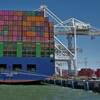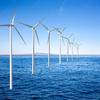Declaration of Nijmegen was signed by the inland shipping sector, along with Minister Van Nieuwenhuizen (Infrastructure and Water Management) on Friday (April 13). This agreement reflects the commitment of the sector to expending its best efforts to expedite the greening process in the years ahead.
The goal is to uphold its competitiveness vis-à-vis road and rail transport, and to reduce CO2 emissions by 20 per cent by 2030.
‘Inland shipping has a substantial lead if you compare its CO2 emissions to those of trucks and trains. In order to retain this lead, inland vessels need to convert to even cleaner engines and fuels,’ to quote Minister Van Nieuwenhuizen. ‘A vessel gives some forty years of service, whereas trucks are obsolete after no more than six or seven years. This means that the sector has no time to lose with respect to its transition to new, cleaner technology. The Declaration of Nijmegen constitutes a fine point of departure to this end.’
In the Declaration of Nijmegen, initiated by the Ministry of Infrastructure and Water Management, in close collaboration with the European Green Capital of Nijmegen, government bodies, port authorities, logistics companies, and shippers have set down their intention to expedite the sustainabilisation of shipping transport.
Currently, the inland shipping sector emits some 2.1 megatons per annum; by 2030, this must be reduced to a maximum of 1.7 megatons. This 20 per cent savings equals the CO2 emitted by nearly 50,000 households. This goal will also be incorporated into the Climate and Energy Agreement to be concluded. By 2050, the inland shipping sector must be climate-neutral.
The Declaration sets out that the participating parties will operate according to a three-step plan: feasibility studies and demonstrations will serve as the basis for practical pilot projects, to be upscaled in step three. The cross-border exploratory study into sustainable inland shipping solutions will be completed by the end of 2020.
Along with emissions, this study also examines power trains as well as alternative and renewable fuels. The sector will select a number of commercially viable ideas from the proposed solutions, to be elaborated in public-private pilot projects. Successful projects will see large-scale implementation. Depending on the solution selected, these projects may be upscaled at an earlier or a later date.
Major logistics companies are already joining the Declaration, which means that a substantial reduction in CO2 emissions will be within reach in the very near future. From now on, the participating shippers will take these emissions into consideration in the choices they make regarding modes of transport, which will prompt them to opt for the least polluting alternative. This will provide an added incentive for transport companies engaged in inland shipping to make sustainable investments in order to become a more interesting alternative to shippers.













